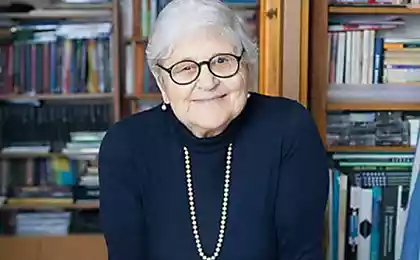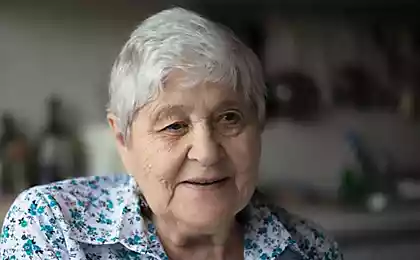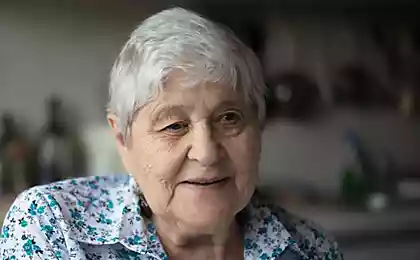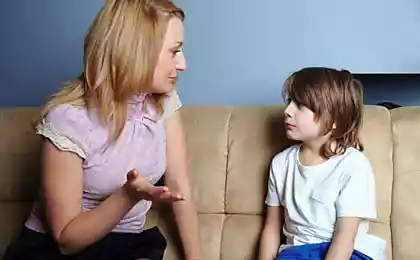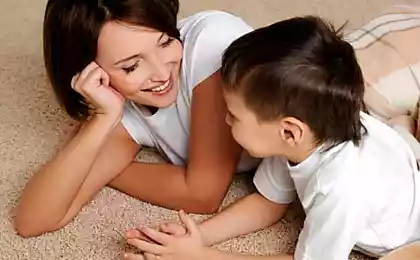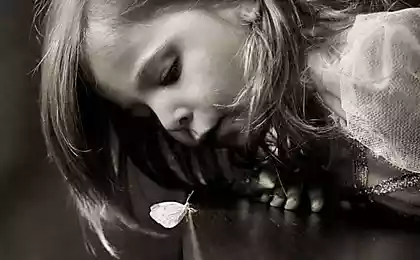504
Julia simultaneously: preserve the child's energy to his own desires!
The education of the child — the process is long, laborious and tedious, and the result is unpredictable. Today to parents there is a lot of literature, a huge number of methodologies, flows and models, as well as many specialists in child psychology. In the former Soviet Union, perhaps the most famous is the child psychologist Julia Gippenreiter. Yulia Borisovna at the moment, 85 years old, she is a Professor of Moscow state University. Lomonosov, the author of numerous books and publications about the education of the child and the mother of three children.
We offer you to familiarize yourself with the basic principles of education at the simultaneously.
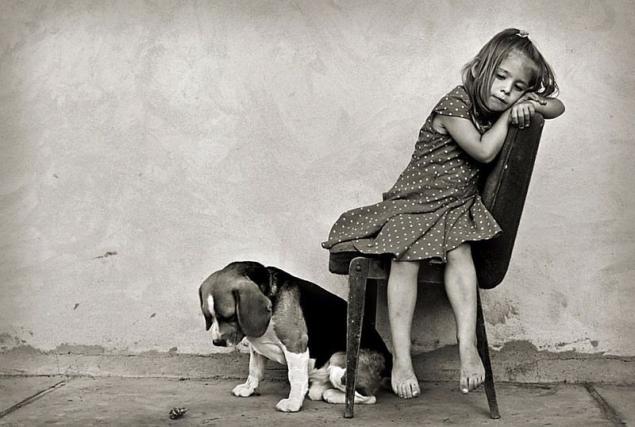
© Monika Koclajda
1. Accept children for who they are
One of the most important conditions for the normal development of a child is a clear understanding by the child that he is loved, important and necessary just by itself, and not because he's "behaving himself", "picking up toys" or "listen to parents". To help parents there are tender touches, hugs and phrases like "I feel good when we are together" and "I'm glad (a), we have what you are". Children understand everything literally and for a little person such marks of parents — the key to sustainable psychological development.
2.Do not interrupt the child if he passionate about something, and don't interfere, if he asks for help And, conversely, definitely help if the child asks. No: you're on your own! To help necessary but only that the child is unable to do it yourself. With the development of the child new knowledge and skills you need to gradually give them to him.
3. Do not deprive the child of energy with his own desires ofParents who want too much for children (music school, chess, specific University is good, according to them, job) usually, it is not easy to live by. The danger is that if parents are persistently trying to introduce their children to the "desired" occupations, and those, in turn, more vigorously begin to engage in "unnecessary cases". After all, every person has by nature the desire to fight for the right to desire and get whatever he needs. Especially often such cases occur with teenagers. You need to understand what personal qualities and abilities of the child develop only in those cases in which they are engaged voluntarily and with interest.
4. To avoid unnecessary conflicts, balance their own desires with the capabilities of the childall parents Have their own expectations about children, that's fine, just don't need to raise the bar too high. When a child learns something new, discovers a new class and acquiring new skills, parents need to be patient and to understand that errors and crashes are inevitable.
5. It is impossible to prevent the accumulation of negative emotions around classes, to which parents want to introduce the childmost of this paragraph deals with the study and preparation of lessons. The fact is that in all that relates to school and lessons, for the child decisions are made, or parents, or teachers. He had absolutely no choice, and learning is the constant compulsion, failure, mistakes, bad grades, abuse and punishment, in a word, the negative emotions that accumulate. From experiences of failure, suffering self-esteem. And those are the times when they say "discouraged".
6. Let the child "fill cones" and learn from their mistakes
We are talking about unwanted termination of care (to clean toys, to Wake up in the morning, checking the lessons). You need to gradually shift the responsibility for their deeds and actions on the child. This will allow him to cultivate self-discipline and confidence. Of course, at first you will have to sacrifice some comfort and prosperity, but, oddly enough, a negative experience for the child is also very important. As a result, he grows up and becomes independent.
7. Life can sometimes teach better than a parentAnd when for the wrong actions of a child is punishable "by life itself", it is not necessary to add the parent edification.
It is important to treat with understanding and empathy to the experiences of the child, not "to add fuel to the fire." But it is not necessary to insure their child from negative consequences of his own actions (of course, if they do not threaten life and health). For it is a valuable experience and cultivating awareness.
8. To punish the child, depriving him of good than making him badFor this to have a supply of pleasant, joyful child of holidays, rituals or traditions that he is waiting for. It is possible to threaten abolition of enjoyable activities, if the child has committed a misdemeanor, but can not abuse it in detail.
9. Do not assign emotional problems of the childwe are Talking about excessive anxiety for children (to let his son on a hike with friends to allow her daughter to celebrate New year's eve outside the home). This quality lies at the very heart of mother nature. The concern is justified, and the child needs empathy and participation of the parents, but in part it is unobtrusive and delicate. After all, with age, children need to separate from parents and emotionally too. The child must be able to confront unpleasant situations and to make their own decisions in all circumstances.
10. Rules (limitations, requirements, prohibitions) must be present in each child's lifeChildren need order and rules of conduct. It makes their life is understandable and predictable, gives a sense of calm and stability. Rules should not be too much, they should be agreed between the parents themselves and not to engage in obvious conflict with the essential needs of the child. It is important not to overdo it with the restrictions not to apply the method of "tightening the screws", as it is impossible to go on about and condone.
11. To pay for doing household chores to a child — it means to confuse, to deprive him of his notions of duty, care, selfless work and family relationshipsthe Child needs to be involved in daily chores (wash dishes, prepare Breakfast, clean the dust, clean bed and so on), as well as other family members, and must implement them — this goes without saying.
12. The teacher, depriving the child freedom of action, killing the natural strength of its developmentIt concerns hyperopic, which is the sin of many parents, and the constant coercion (to learn, to play the violin and so on). The child should be a private time for lessons, which he likes. Children naturally have the desire for communication, growth and development, positive self-esteem and freedom. You cannot deprive children of the joy of finding and learning. Otherwise, the child is not prepared for the choice of the way of her life.
13. "Children's" games don't happen
Even the busiest parents need to make time for being together with children. During this time you must live in the world of the child, his fantasies, interesting to talk, to play, to joke, to laugh. In these moments it is important to communicate on equal terms. Children play with their parents preparing the baby for life. Through play the child is aware that it does not always succeed, and to achieve the goal you want to work, to think and to know a lot.
14. General contact with a child consists of the accumulation of many cases of understanding by the parent to the everyday experiencesNeeded for equal and friendly tone to talk, think and look for options out of an unpleasant situation, no matter how trivial it may seem. The child must understand that parents do listen, understand and accept his anxiety. Understanding personal experiences of children — the main condition for good relations and trust with them.
15. Children are very strict and sensitive judgesThey very poorly tolerate injustice, insincerity, dishonesty, stupidity and brutality of adults. All children dream about the perfect parents, but only the smallest believe those of their father and mother. Very soon they begin to objectively assess and often disappointed. The child is always with fondness is watching, do the parents what is required of him.
In our country the traditional approach to child rearing that is passed down from generation to generation since the Soviet era, suggests that if the child does what they say it should be punished, rude to scold, hurt — dump all the blame on him. The essence of all principles of education Yulia Gippenreiter is a humane approach to children and taking into account all their interests and needs.published
P. S. And remember, just changing your mind — together we change the world! © Join us at Facebook , Vkontakte, Odnoklassniki
Source: lady.tut.by/news/relationship/474276.html
We offer you to familiarize yourself with the basic principles of education at the simultaneously.

© Monika Koclajda
1. Accept children for who they are
One of the most important conditions for the normal development of a child is a clear understanding by the child that he is loved, important and necessary just by itself, and not because he's "behaving himself", "picking up toys" or "listen to parents". To help parents there are tender touches, hugs and phrases like "I feel good when we are together" and "I'm glad (a), we have what you are". Children understand everything literally and for a little person such marks of parents — the key to sustainable psychological development.
2.Do not interrupt the child if he passionate about something, and don't interfere, if he asks for help And, conversely, definitely help if the child asks. No: you're on your own! To help necessary but only that the child is unable to do it yourself. With the development of the child new knowledge and skills you need to gradually give them to him.
3. Do not deprive the child of energy with his own desires ofParents who want too much for children (music school, chess, specific University is good, according to them, job) usually, it is not easy to live by. The danger is that if parents are persistently trying to introduce their children to the "desired" occupations, and those, in turn, more vigorously begin to engage in "unnecessary cases". After all, every person has by nature the desire to fight for the right to desire and get whatever he needs. Especially often such cases occur with teenagers. You need to understand what personal qualities and abilities of the child develop only in those cases in which they are engaged voluntarily and with interest.
4. To avoid unnecessary conflicts, balance their own desires with the capabilities of the childall parents Have their own expectations about children, that's fine, just don't need to raise the bar too high. When a child learns something new, discovers a new class and acquiring new skills, parents need to be patient and to understand that errors and crashes are inevitable.
5. It is impossible to prevent the accumulation of negative emotions around classes, to which parents want to introduce the childmost of this paragraph deals with the study and preparation of lessons. The fact is that in all that relates to school and lessons, for the child decisions are made, or parents, or teachers. He had absolutely no choice, and learning is the constant compulsion, failure, mistakes, bad grades, abuse and punishment, in a word, the negative emotions that accumulate. From experiences of failure, suffering self-esteem. And those are the times when they say "discouraged".
6. Let the child "fill cones" and learn from their mistakes
We are talking about unwanted termination of care (to clean toys, to Wake up in the morning, checking the lessons). You need to gradually shift the responsibility for their deeds and actions on the child. This will allow him to cultivate self-discipline and confidence. Of course, at first you will have to sacrifice some comfort and prosperity, but, oddly enough, a negative experience for the child is also very important. As a result, he grows up and becomes independent.
7. Life can sometimes teach better than a parentAnd when for the wrong actions of a child is punishable "by life itself", it is not necessary to add the parent edification.
It is important to treat with understanding and empathy to the experiences of the child, not "to add fuel to the fire." But it is not necessary to insure their child from negative consequences of his own actions (of course, if they do not threaten life and health). For it is a valuable experience and cultivating awareness.
8. To punish the child, depriving him of good than making him badFor this to have a supply of pleasant, joyful child of holidays, rituals or traditions that he is waiting for. It is possible to threaten abolition of enjoyable activities, if the child has committed a misdemeanor, but can not abuse it in detail.
9. Do not assign emotional problems of the childwe are Talking about excessive anxiety for children (to let his son on a hike with friends to allow her daughter to celebrate New year's eve outside the home). This quality lies at the very heart of mother nature. The concern is justified, and the child needs empathy and participation of the parents, but in part it is unobtrusive and delicate. After all, with age, children need to separate from parents and emotionally too. The child must be able to confront unpleasant situations and to make their own decisions in all circumstances.
10. Rules (limitations, requirements, prohibitions) must be present in each child's lifeChildren need order and rules of conduct. It makes their life is understandable and predictable, gives a sense of calm and stability. Rules should not be too much, they should be agreed between the parents themselves and not to engage in obvious conflict with the essential needs of the child. It is important not to overdo it with the restrictions not to apply the method of "tightening the screws", as it is impossible to go on about and condone.
11. To pay for doing household chores to a child — it means to confuse, to deprive him of his notions of duty, care, selfless work and family relationshipsthe Child needs to be involved in daily chores (wash dishes, prepare Breakfast, clean the dust, clean bed and so on), as well as other family members, and must implement them — this goes without saying.
12. The teacher, depriving the child freedom of action, killing the natural strength of its developmentIt concerns hyperopic, which is the sin of many parents, and the constant coercion (to learn, to play the violin and so on). The child should be a private time for lessons, which he likes. Children naturally have the desire for communication, growth and development, positive self-esteem and freedom. You cannot deprive children of the joy of finding and learning. Otherwise, the child is not prepared for the choice of the way of her life.
13. "Children's" games don't happen
Even the busiest parents need to make time for being together with children. During this time you must live in the world of the child, his fantasies, interesting to talk, to play, to joke, to laugh. In these moments it is important to communicate on equal terms. Children play with their parents preparing the baby for life. Through play the child is aware that it does not always succeed, and to achieve the goal you want to work, to think and to know a lot.
14. General contact with a child consists of the accumulation of many cases of understanding by the parent to the everyday experiencesNeeded for equal and friendly tone to talk, think and look for options out of an unpleasant situation, no matter how trivial it may seem. The child must understand that parents do listen, understand and accept his anxiety. Understanding personal experiences of children — the main condition for good relations and trust with them.
15. Children are very strict and sensitive judgesThey very poorly tolerate injustice, insincerity, dishonesty, stupidity and brutality of adults. All children dream about the perfect parents, but only the smallest believe those of their father and mother. Very soon they begin to objectively assess and often disappointed. The child is always with fondness is watching, do the parents what is required of him.
In our country the traditional approach to child rearing that is passed down from generation to generation since the Soviet era, suggests that if the child does what they say it should be punished, rude to scold, hurt — dump all the blame on him. The essence of all principles of education Yulia Gippenreiter is a humane approach to children and taking into account all their interests and needs.published
P. S. And remember, just changing your mind — together we change the world! © Join us at Facebook , Vkontakte, Odnoklassniki
Source: lady.tut.by/news/relationship/474276.html


